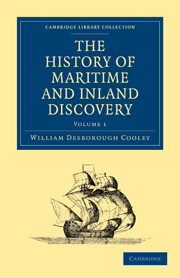Book contents
- Frontmatter
- Contents
- BOOK I GEOGRAPHY OF THE ANCIENTS
- BOOK II GEOGRAPHY OF THE MIDDLE AGES
- BOOK III PROGRESS OF GEOGRAPHY IN THE MIDDLE AGES
- CHAP. I DISCOVERIES OF THE NORTHMEN
- CHAP. II MAPS OF THE MIDDLE AGES
- CHAP. III JOURNEY OF CARPINI INTO TATARY
- CHAP. IV TRAVELS OF RUBRUQUIS
- CHAP. V TRAVELS OP MARCO POLO
- CHAP. VI TRAVELS OF MARCO POLO CONTINUED
- CHAP. VII ODERIC OF PORTENAU
- CHAP. VIII EMBASSY OF CLAVIJO
- CHAP. IX EARLY DISCOVERIES OF THE PORTUGUESE
- CHAP. X THE PASSAGE BY THE CAPE DISCOVERED
CHAP. I - DISCOVERIES OF THE NORTHMEN
Published online by Cambridge University Press: 05 July 2011
- Frontmatter
- Contents
- BOOK I GEOGRAPHY OF THE ANCIENTS
- BOOK II GEOGRAPHY OF THE MIDDLE AGES
- BOOK III PROGRESS OF GEOGRAPHY IN THE MIDDLE AGES
- CHAP. I DISCOVERIES OF THE NORTHMEN
- CHAP. II MAPS OF THE MIDDLE AGES
- CHAP. III JOURNEY OF CARPINI INTO TATARY
- CHAP. IV TRAVELS OF RUBRUQUIS
- CHAP. V TRAVELS OP MARCO POLO
- CHAP. VI TRAVELS OF MARCO POLO CONTINUED
- CHAP. VII ODERIC OF PORTENAU
- CHAP. VIII EMBASSY OF CLAVIJO
- CHAP. IX EARLY DISCOVERIES OF THE PORTUGUESE
- CHAP. X THE PASSAGE BY THE CAPE DISCOVERED
Summary
The nations of the North, however rude and barbarous they might appear in the eyes of the luxurious Romans, were yet raised far above the abject condition of an utter indifference to knowledge. The kindred races of the German and Sclavonian nations were very extensively diffused: their free polity and restless disposition maintained a perpetual intercourse between them; and even the nature of the country which they occupied seems to warrant the conclusion, that the geographical knowledge possessed by the northern nations was never circumscribed within such narrow limits as those which confined the views of the early inhabitants of Greece and Italy.
In all the accounts that remain to us of Scandinavia, from the age of Pytheas to that of Alfred, we meet with none but Gothic names. Again, the Scandinavian mythology preserved in the Edda presents only those physical traits which properly belong to northern climates, and those usages which are found only among a warlike and a maritime people. Thus, a northern god invents the art of skating, and the mortal remains of a deified hero are consumed on a vessel launched out to sea. Even in Valhalla, the clashing of arms is heard amid the festivities, and mead takes the place of nectar at the table of Odin. All these circumstances, poetical, geographical, and mythological, combine to prove that from the remotest times Scandinavia, properly so called, has been in the occupation of a single people.
- Type
- Chapter
- Information
- The History of Maritime and Inland Discovery , pp. 209 - 225Publisher: Cambridge University PressPrint publication year: 2010First published in: 1830



